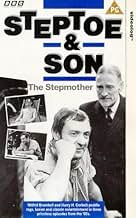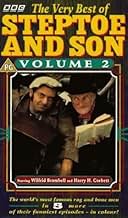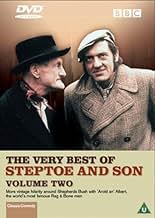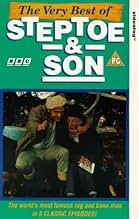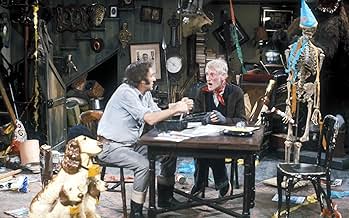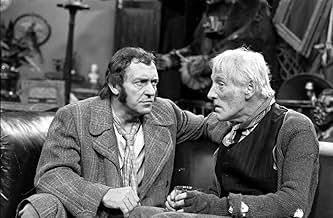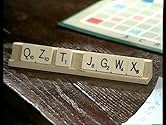IMDb-BEWERTUNG
7,8/10
3583
IHRE BEWERTUNG
Füge eine Handlung in deiner Sprache hinzuBritish sitcom about a father-and-son rag-and-bone business in London. The intergenerational divide between the miserly Steptoe and his ambitious son results in comedy, drama, and tragedy.British sitcom about a father-and-son rag-and-bone business in London. The intergenerational divide between the miserly Steptoe and his ambitious son results in comedy, drama, and tragedy.British sitcom about a father-and-son rag-and-bone business in London. The intergenerational divide between the miserly Steptoe and his ambitious son results in comedy, drama, and tragedy.
- Auszeichnungen
- 2 wins total
Folgen durchsuchen
Empfohlene Bewertungen
One of the saddest sights I ever saw on television was Wilfrid Brambell, close to tears on 'Nationwide' in 1982 following the sudden death of his 'Steptoe & Son' co-star Harry H.Corbett. The pairing of these great actors, combined with some wonderful scripts by Ray Galton and Alan Simpson, made 'Steptoe' a classic. I think viewers recognised the truthfulness of the situation; rag and bone man Harold desperately wanted to escape from his father's domination to begin a new life on his own, but couldn't because he loved the old man too much. When searching for comedy ideas, today's writers fall into the trap of thinking: "How can I shock the public?". 'Steptoe' did not set out to shock, yet did because it was so real. After a successful run in the '60's, it was revived in the '70's in colour, and these episodes are my favourites, particularly 'Divided We Stand' in which Harold and Albert tried to lead separate lives in the same house. The word 'timeless' is overused these days, but it definitely applies here.
A brilliant exercise in British comedy from the sixties and seventies ! Not one episode fails to please and the dialogues were extremely savoury. A certain number of episodes are available on BBC dvds in the UK region 2. The picture quality of the latter episodes is so good that you'd swear they'd been made yesterday. It is hard to believe that both of these characters have sadly left us but thanks to this series they will live on forever in our hearts and minds ! It appears that in real life, Wilfred Brambell was an exceedingly well-spoken man and didn't have a common accent at all. In one of the episodes involving Harold acting in a play, we do in fact hear Albert speak in a very posh voice albeit very briefly.
Steptoe & Son (SS), was a national institution back in the 60s & 70s. There were huge TV audiences all clamouring to watch the latest episode in the lives of two lonely but dependent rag & bone men in Sheperds Bush, London.
So big were the audience figures at around 7pm at night that even the-then Prime Minster, Harold Wilson, had to postpone a General Election campaign because it clashed with this hugely popular show.
Harold is the middle aged son, frustrated with his boring job as a "totter" and being constantly tied down by his irritating and manipulating father.
Harold is a dreamer, a person who sees himself as an intellectual, a poet, an classical actor, a gentleman, a ladies man and sucessful businessman....and yet this is just his little dream, the kind of dream we all wish for. But in Harold's mind only his father is really holding him back from making those dreams a reality.
Albert, on the other hand, has seen it all. He is a bitter old man who was brought up in a poor family and life was tough, especially having to suffer going through two world wars. He also realises that he never made a success of his life in a business sense. After decades of being a rag & bone man he is still no richer than his own father was.
But to add to this bitterness, he is also scared of being left totally alone in an uncaring modern world. He no longer has a wife, no daughters, hardly any family at all to fall back on. The only person he can really trust & depend on is his son, Harold. And Albert will do anything to ruin Harold's chances of either bettering his own life elsewhere or making sure he never leaves him to fend for himself.
And so for the next 12 years British audiences peeked into the daily lives & scrabbles of this odd couple with Harold trying to escape to a better world and Albert making sure he doesn't.
The scripts remained consistantly good throughout this era of new comedy. Boundaries of acceptable taste during this time were pushed ever further and the onset of moderately bad language from these two gents became common place.
Some purists saw it as vulgar, crude and the thin end of the cultural wedge, while the majority felt it was nothing more than how life in the real world is portrayed, and that is probably one reason why it was so successful, because we could all empathise with the two characters as they struggle for their own particular hopes & dreams.
It should be added that in real life both lead actors, Wilfred Brambell & Harry H Corbett slowly began to hate each other just as much as the characters they portrayed in the show. Brambell was very much a refined gentleman in real life and usually was very dismissive of the poor and working class (which is the great paradox of his own character).
At the same time Harry H Corbett felt he had become for-ever typecast with this Harold Steptoe millstone. He was desperate to do serious acting or to return to the theatre, but the roles he recieved were little more than Harold Steptoe by any other name. And as a consequence Harry would never get the chance to try new challenges and would always be associated and thought of as Harold.
So there was lots of real bitterness in the latter years of the show, in fact some of the episodes were too close to the bone for some. There was an episode, for example, where Harold was given the starring role in an amateur play and for once he had high hopes of breaking away from the shackles of his present employer, only for the ever sceptical Albert to tell him that he will never be a real actor because he has no talent, no class, no skill, nothing at all in fact. You could almost sense the real hostility behind those masks when Albert confronted Harold.
But for all that, SS on its own, is still a much loved show and often repeated and still remains as fresh & funny as ever. The less said about the two movie spinoffs the better.
****/*****
So big were the audience figures at around 7pm at night that even the-then Prime Minster, Harold Wilson, had to postpone a General Election campaign because it clashed with this hugely popular show.
Harold is the middle aged son, frustrated with his boring job as a "totter" and being constantly tied down by his irritating and manipulating father.
Harold is a dreamer, a person who sees himself as an intellectual, a poet, an classical actor, a gentleman, a ladies man and sucessful businessman....and yet this is just his little dream, the kind of dream we all wish for. But in Harold's mind only his father is really holding him back from making those dreams a reality.
Albert, on the other hand, has seen it all. He is a bitter old man who was brought up in a poor family and life was tough, especially having to suffer going through two world wars. He also realises that he never made a success of his life in a business sense. After decades of being a rag & bone man he is still no richer than his own father was.
But to add to this bitterness, he is also scared of being left totally alone in an uncaring modern world. He no longer has a wife, no daughters, hardly any family at all to fall back on. The only person he can really trust & depend on is his son, Harold. And Albert will do anything to ruin Harold's chances of either bettering his own life elsewhere or making sure he never leaves him to fend for himself.
And so for the next 12 years British audiences peeked into the daily lives & scrabbles of this odd couple with Harold trying to escape to a better world and Albert making sure he doesn't.
The scripts remained consistantly good throughout this era of new comedy. Boundaries of acceptable taste during this time were pushed ever further and the onset of moderately bad language from these two gents became common place.
Some purists saw it as vulgar, crude and the thin end of the cultural wedge, while the majority felt it was nothing more than how life in the real world is portrayed, and that is probably one reason why it was so successful, because we could all empathise with the two characters as they struggle for their own particular hopes & dreams.
It should be added that in real life both lead actors, Wilfred Brambell & Harry H Corbett slowly began to hate each other just as much as the characters they portrayed in the show. Brambell was very much a refined gentleman in real life and usually was very dismissive of the poor and working class (which is the great paradox of his own character).
At the same time Harry H Corbett felt he had become for-ever typecast with this Harold Steptoe millstone. He was desperate to do serious acting or to return to the theatre, but the roles he recieved were little more than Harold Steptoe by any other name. And as a consequence Harry would never get the chance to try new challenges and would always be associated and thought of as Harold.
So there was lots of real bitterness in the latter years of the show, in fact some of the episodes were too close to the bone for some. There was an episode, for example, where Harold was given the starring role in an amateur play and for once he had high hopes of breaking away from the shackles of his present employer, only for the ever sceptical Albert to tell him that he will never be a real actor because he has no talent, no class, no skill, nothing at all in fact. You could almost sense the real hostility behind those masks when Albert confronted Harold.
But for all that, SS on its own, is still a much loved show and often repeated and still remains as fresh & funny as ever. The less said about the two movie spinoffs the better.
****/*****
Steptoe and Son is probably the best British comedy ever. Featuring late stars, Wilfred Brambell and Harry H Corbett, this was an excellent show which never failed to amuse me and was true to life.
The show featured pensioner Albert Steptoe and his son Harold Steptoe (a pair of rag and bone men). They bickered, the fought, they sulked and generally got on each other's nerves. But underneath, there was a mutual love.
This show kind of reminded me of my own life. Even though I love my own dad, I did spend quite a few years of my life arguing with him even when I left home at 18. We were two different people with different outlooks on life and this led to some battles at times. This show was the same. Albert and Harold could not have been more different. Harold was fed up with his dad's filthy habits and moaning; Albert was always playing on Harold's emotions with phrases such as, "I'm an old man Harold. Need looking after." Also funny was the fact that Albert always ruined any prospective relationship that Harold was going to engage in. But they loved each other deep down and that was the fun of it.
Truly the greatest British comedy ever.
The show featured pensioner Albert Steptoe and his son Harold Steptoe (a pair of rag and bone men). They bickered, the fought, they sulked and generally got on each other's nerves. But underneath, there was a mutual love.
This show kind of reminded me of my own life. Even though I love my own dad, I did spend quite a few years of my life arguing with him even when I left home at 18. We were two different people with different outlooks on life and this led to some battles at times. This show was the same. Albert and Harold could not have been more different. Harold was fed up with his dad's filthy habits and moaning; Albert was always playing on Harold's emotions with phrases such as, "I'm an old man Harold. Need looking after." Also funny was the fact that Albert always ruined any prospective relationship that Harold was going to engage in. But they loved each other deep down and that was the fun of it.
Truly the greatest British comedy ever.
This is a BBC sitcom that's set in Shepherd's Bush, West London. It's about a father and son who are rag-and-bone men. It ran from 1962-1974. There were also films, plays, documentaries and versions of the TV series made by other countries.
It's well-written and well-acted. There are many good performances from actors who only appear in one or two episodes each.
It's well-written and well-acted. There are many good performances from actors who only appear in one or two episodes each.
Wusstest du schon
- WissenswertesWilfrid Brambell was only 49 when he began playing Albert Steptoe, who was supposed to be 63 when the series began.
- PatzerThe physical positioning of the Steptoe's outside toilet varies over the course of the series: sometimes it is plumbed in facing the yard gates, at other times it's rotated to face the wall.
- Zitate
[repeated line]
Harold Steptoe: You dirty old man!
- VerbindungenAlternate-language version of Stiefbeen en zoon (1963)
Top-Auswahl
Melde dich zum Bewerten an und greife auf die Watchlist für personalisierte Empfehlungen zu.
Details
- Erscheinungsdatum
- Herkunftsland
- Sprache
- Auch bekannt als
- Степто и сын
- Drehorte
- Stable Way, Kensington, London, England, Vereinigtes Königreich(Junkyard exteriors)
- Produktionsfirma
- Weitere beteiligte Unternehmen bei IMDbPro anzeigen
- Laufzeit45 Minuten
- Farbe
- Sound-Mix
- Seitenverhältnis
- 1.33 : 1
Zu dieser Seite beitragen
Bearbeitung vorschlagen oder fehlenden Inhalt hinzufügen

Oberste Lücke
By what name was Steptoe and Son (1962) officially released in India in English?
Antwort
